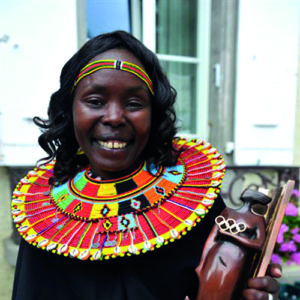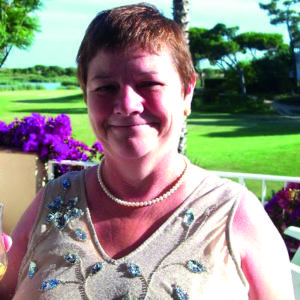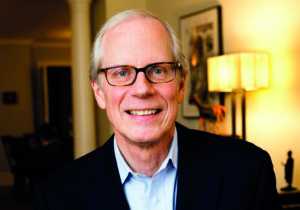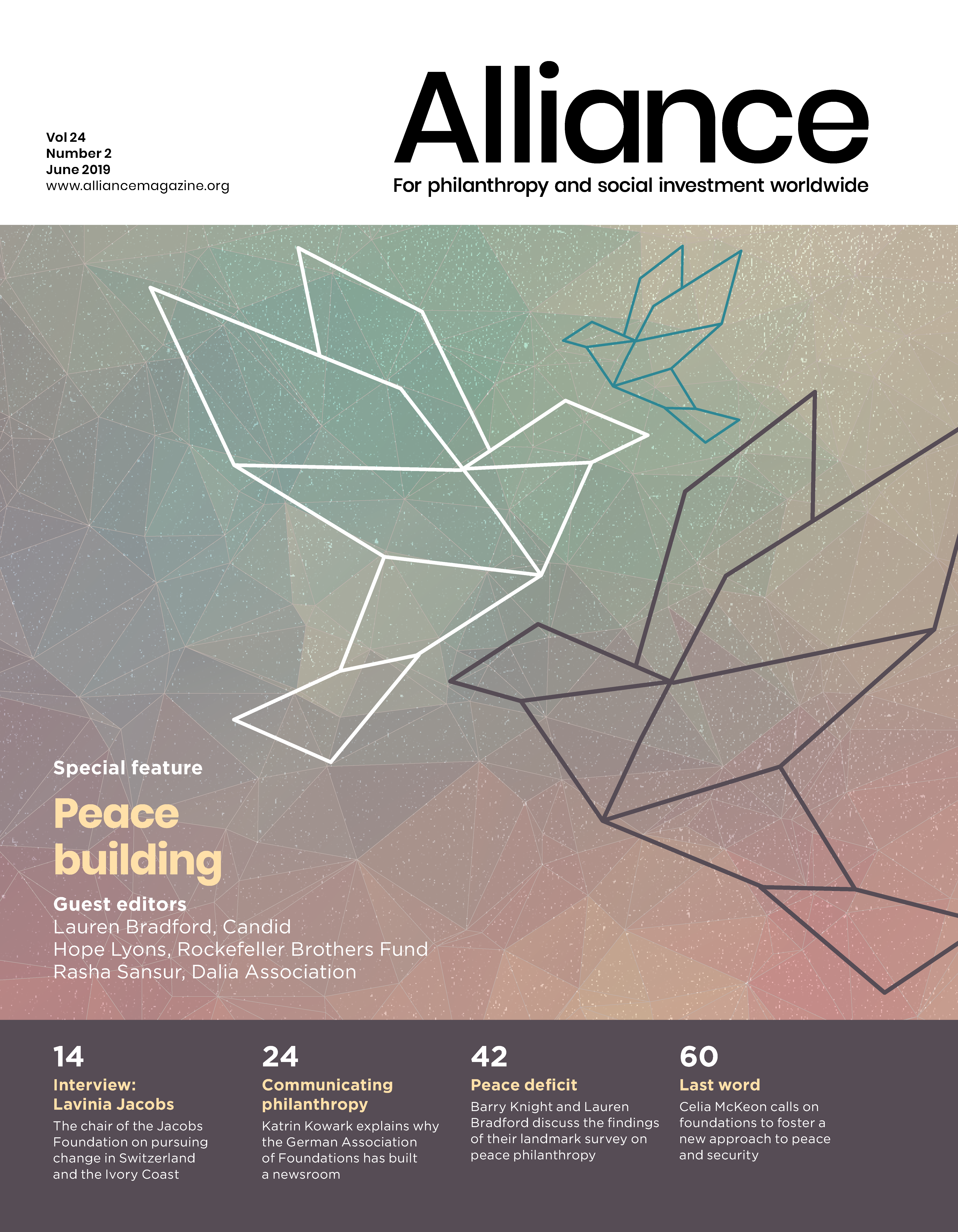Andrew Milner profiles some of the pioneering individuals and networks that have led philanthropy for peace-building, including in some cases supporting or initiating negotiations between parties in conflict
Pioneers
 Tegla Loroupe
Tegla Loroupe
Catherine Mwendwa of the East Africa Philanthropy Network writes: ‘Tegla Loroupe is a Kenyan woman, philanthropist, and former world champion marathon runner. She is the first African woman to win the New York Marathon and went on to win many major marathons ranking her as one of the most influential athletes. She is recognised for her role in the introduction of the first ever refugee Olympics team, in Rio 2016. Tegla is a strong peace ambassador and active humanitarian with a particular focus on disarmament and peace campaigns among warring pastoralist communities in Kenya and neighbouring Uganda. Reflecting back on the conflicts that have afflicted her community, she founded the Tegla Loroupe Peace Foundation in 2003 that has since reached out to goodwill partners locally and internationally in support of community peace dialogues, reconciliation and rehabilitation campaigns. Her efforts in building peaceful communities have been recognised globally. In 2007, she was named the Oxfam Ambassador for Sport and Peace in Dafur.’
 Avila Kilmurray
Avila Kilmurray
During her time as head of the Community Foundation for Northern Ireland (CFNI) from 1994 to 2015, Avila Kilmurray was credited with taking the then unprecedented step of talking to members of groups involved in the long-running conflict in Northern Ireland and bringing them into dialogue. It was also under her leadership that CFNI developed its thrust towards peace-building and conflict resolution, which became one of its priority areas. While its work remained anchored in Northern Ireland, CFNI was also involved in numerous international initiatives in areas emerging from conflict. It became a founder member of the Foundations for Peace Network, a peer network of independent indigenous funders working in contested societies. Kilmurray remains actively involved in the area of philanthropy and peace-building. She serves as a consultant with The Social Change Initiative, is a member of the Philanthropy for Social Justice and Peace network and a trustee of Conciliation Resources.
 Stephen Pittam
Stephen Pittam
Stephen Pittam was secretary of the UK’s Joseph Rowntree Charitable Trust (JRCT) from 2001 to 2012. During this time, the trust was critically involved in assisting the peace processes in both Northern Ireland and the Basque country in Spain. In addition to long-standing support for peace-building in Northern Ireland, JRCT funded or part-funded the work of South African human rights lawyer Brian Currin in his attempts to mediate in both processes, in the latter case ultimately successfully. In doing so, JRCT drew criticism from other foundations and from the Spanish media. Its support for difficult work on sensitive issues is a distinguishing feature of the organisation which continues to this day. A measure of Stephen Pittam’s commitment to issues of peace and justice and of the esteem in which he is held in the sector is the fact that, when CFNI inaugurated a social justice award in Northern Ireland in 2013, it was named the Stephen Pittam Social Justice Award.
 Stephen Heintz
Stephen Heintz
Stephen Heintz has been president of the Rockefeller Brothers Fund (RBF) since 2001. Beginning with a meeting in Stockholm in 2002, he spearheaded successful Track II diplomacy efforts between the US and Iran that helped lead to the eventual renewal of contact between the two nations’ governments, which had lapsed in 1979. These confidential Track II dialogues helped pave the way for the international nuclear agreement with Iran in 2015. The work earned the RBF the thanks of the White House and US State Departments. In 2018, Heintz was awarded the Council on Foundation’s Distinguished Service Award in recognition of his work. In the citation for the award, Gene Cochran of CoF described him as having ‘led discussions on some of the more challenging issues of our time, including climate change, US-Iran relations, the European integration of the Balkans, and the Israeli-Palestinian conflict’.
Oliver McTernan
Oliver McTernan, a former Catholic priest, has a long track record in conflict resolution and interfaith relationships. In 2002, he initiated the first post-conflict talks between Nato and the former Yugoslav government. He was a visiting fellow of the Weatherhead Centre for International Affairs at Harvard University 2000-03, and is a senior associate fellow of the UK Defence Academy. He was responsible for initiating the first post-Kosovo conflict talks between Nato and the Belgrade government. In 2004, he became co-founder and director of Forward Thinking, whose aims are to promote a more inclusive peace process in the Israeli-Palestinian conflict, and to facilitate political dialogues between the Arab/Muslim and Western worlds. In the UK it is working to promote greater understanding and confidence between the diverse grassroots Muslim communities and the wider society including the media and the British establishment. McTernan is the author of the book Violence in God’s Name which explores the roots of violence within each of the major faith traditions.
Networks
The Peace and Security Funders Group
The Peace and Security Funders Group (PSFG), a network of foundations and individual philanthropists, was founded in 2000 in response to a need for greater communication and collaboration among existing funders, as well as for a means to encourage increased philanthropic activity in that area. PSFG is currently pursuing two main objectives: seeding collaboration and providing opportunities for its members (which according to its website currently stands at 59) to share information and best practice; creating bridges between the philanthropic and public sectors by cultivating relationships, convening meetings, and brokering partnerships between members and policymakers. In collaboration with Candid, it produces the Peace and Security Funding Index which details who is active in the area, on what themes and in what regions funding is spent.
http://www.peaceandsecurity.org
PeaceNexus Foundation
PeaceNexus is a Swiss-based foundation established in 2009 with an endowment from philanthropist Hansjörg Wyss. Its mission is to strengthen the competencies of, and collaboration between, organisations to increase their contribution to building peace. PeaceNexus multiplies the peace-building impact of its partners through organisational development for peace-building champions, developing capacity for conflict sensitivity, and by supporting inclusive dialogue with business to develop solutions to local peace-building challenges. The foundation supports international organisations along with organisations in west Africa, western Balkans, central Asia and South-East Asia.
http://www.peacenexus.org
Reconstruction Women’s Fund, Serbia
The first local women’s foundation in Serbia, the Reconstruction Women’s Fund was set up in 2004 with a mission to support and maintain a feminist political platform against war, nationalism, racism and militarism, and against violence and any form of discrimination against women. Many of the fund’s grants go to self-organised groups of girls and young women. It also prioritises support to Roma women’s groups, women organising in small places outside the country’s capital, and networking and campaigning activities across the Serbian women’s movement. It receives support from institutions and individuals within and outside Serbia. Well-known organisations providing support include the Sigrid Rausing Trust, the Oak Foundation, Mama Cash and the Global Fund for Women.
http://www.rwfund.org
Women Peace and Security Collective, Colombia
The Women Peace and Security Collective is an initiative of dialogue and reconciliation between women of different social, economic and political backgrounds. It includes human rights activists, academics, former combatants, members of the security sector, indigenous and black women, journalists and businesswomen. Its members share a common commitment to a better future for all in Colombia. Its basic attitude is distilled in an Ethical Pact for Peace, calling for an ‘ethical revolution’ and a transformation of the attitudes and situations that have perpetuated conflict in Colombia. It was launched to accompany and to animate the peace negotiations between the Colombian government and the Revolutionary Armed Forces of Colombia (FARC).
https://tinyurl.com/WPSC-Colombia
Fundación Ideas para la Paz, Colombia
Established by a group of Colombian businesspeople in 1999, Fundación Ideas para la Paz (FIP) has contributed to solutions to overcome the Colombian armed conflict. Recognising the many causes of the conflict, FIP is committed to widening understanding of these, drawing attention to political and social unrest in the country and exercising leadership in mobilising citizens, government officials and the business sector around the common goal of building a peaceful society throughout Colombia. Its work is based on creating a culture of peace and legality, the idea of security as a public asset that requires action by both state and citizens, the strengthening of institutions and the encouragement of active participation by the business sector.
http://www.ideaspaz.org
Community Foundation for Northern Ireland
Established in 1979 as the Northern Ireland Voluntary Trust, the organisation became the Community Foundation for Northern Ireland (CFNI) in 2002. It has been committed throughout its history to peace-building, social justice and effective community development. To this end it developed programmes such as its work with politically motivated ex-prisoners, through which it was able to bring ex-prisoners from both the loyalist and republican sides together to explore joint initiatives. While its core themes remain, more recently CFNI has modified the way it obtains and manages funds. For example, it now manages grantmaking programmes for groups which include Comic Relief, Big Lottery and Santander in addition to distributing its own grants. It has also recently set up the Circle of Change fund which operates under its aegis, a derivative of the giving circle idea where a small group of would-be donors has come together and has received training in grantmaking and fundraising.
http://www.communityfoundationni.org
Conciliation Resources
Based in London, Conciliation Resources is an international organisation committed to stopping violent conflict and creating more peaceful societies. It works with people affected by war and violence, connecting community perspectives with political dialogue and drawing on lessons from peace processes around the world. Established in 1994 and supported by a number of multilateral organisations, foundations and individuals, its experience spans the Caucasus, Africa, Latin America, south Asia, South-East Asia and the Pacific. It also produces the Accord publication series which examines specific conflicts and common peace-building themes, and presents the experiences and insights of local and international experts, as well as people affected by conflict. There are publications on specific conflicts, such as Nepal and Afghanistan, and on themes such as inclusion in peace processes and engaging armed groups.
http://www.c-r.org
The Social Change Initiative
The Social Change Initiative (SCI) describes its mission as securing ‘progressive social change, so that communities become more inclusive, fairer and peaceful’. Established by a so-called ‘tie-off’ grant from Atlantic Philanthropies, while SCI is registered with the Northern Ireland Charity Commission, its status is that of a limited company, rather than a non-profit organisation. One of its key areas of work is migration which it regards as among ‘the defining human rights issues of our time’. It also sees activism in its various forms as a key strategy and has led debate on the use of litigation to achieve social change, convening an international conference on the issue in 2016.
http://www.thesocialchangeinitiative.org
The Arab Reform Initiative
The Arab Reform Initiative (ARI) is a think-tank comprising a network of independent Arab research and policy institutes, with partners from the Middle East, the Maghreb, Europe, Latin America and the US. Led by Syrian academic, Bassma Kodmani and founded in 2005, its aim is to articulate a homegrown agenda for democratic change. It conducts research and policy analysis and provides a platform for inspirational voices based on the principles of diversity, impartiality and social justice. Particularly notable for present purposes is its work in mapping the Syrian diaspora, based on the belief that the soft power the diaspora wields could hold the key to a peaceful resolution of the current Syrian crisis. Partners include the Center for Strategic Studies (Jordan), the Syrian League for Citizenship, the Gulf Research Centre (UAE), the Casa Árabe (Spain) and the US Middle East Project.
http://www.arab-reform.net
Philanthropy for Social Justice and Peace
Established in 2007, Philanthropy for Social Justice and Peace is a global network of philanthropy practitioners working to increase the amount and impact of grantmaking for social justice and peace. It acts as an incubator of new ideas for achieving systemic change particularly in support of communities that are suffering the worst effects of poverty, conflict, discrimination and environmental degradation. The main thrust of its work is creating and supporting a community of practice of philanthropy for social justice and peace, developing grantmaking practices that will advance the field, and shifting the narrative in philanthropy to one that places social justice and peace at its centre. Since 2017, it has adopted a new approach to its work which stresses narrative development, the creation of learning opportunities and the development of infrastructure.
http://www.psjp.org
Peace Insight
A publication of Peace Direct, an international charity dedicated to stopping wars, Peace Insight is a leading online resource for local peace-building around the world.
Launched in 2007 to bring greater attention to the work of local peace-builders, Peace Insight maps and highlights the work of its network of journalists, activists, and peace-builders, or Local Peacebuilding Experts (LPEs). The LPEs, who are based in several African countries, Colombia, Afghanistan, Pakistan, Kashmir, Ukraine and Lebanon, provide in-depth knowledge of over 40 conflicts around the world and the organisations working on the ground to resolve them. The LPEs identify local peace-building organisations to be featured in Peace Insight’s interactive database, offer expert commentary and analysis on conflicts and security issues in their part of the world, and help Peace Direct organise peace-building workshops and conferences around the globe.
http://www.peaceinsight.org
Spotlight on an outlier
Bridgeway Foundation
In 2010, the Texas based Bridgeway Foundation, whose mission is to end genocide, began negotiations with the Ugandan army. The result of these was Bridgeway’s supplying equipment (including aircraft) to, and funding training for, the army in its pursuit of Joseph Kony, leader of the so-called Lord’s Resistance Army (LRA) which over nearly three decades had abducted tens of thousands of people, mostly children, and had perpetrated atrocities against civilian populations. Not the least contentious aspect of this intervention was the fact that the organisation eventually hired to provide the training, the euphemistically named Executive Outcomes, was headed by Eeben Barlow, described as a commando and a covert agent for the South African apartheid regime’s most notorious squads. Though the effort was led by Bridgeway, other philanthropists, including Howard Buffett, later came on board. ‘We spent money on reintegration of child soldiers, on rebuilding agricultural areas, counselling rape victims. Why would you not jump at the chance to stop the core problem?’ he is quoted as saying in an article in the New Yorker documenting the story.
While Kony continues to elude capture, he has been hounded out of formerly safe havens. In the two years following the intervention, LRA killings dropped from 706 in 2010 to 51 in 2012.
The Ugandan case raises a big question. The work of much philanthropy in the peace and security field involves supporting mediation between two contending parties to try to end conflict – the conflict is the enemy. In this initiative, the balance is altered as Bridgeway sought to intervene in favour of one side, which involves making a judgement on the rightness of that side’s cause. While in the Kony case, the judgement might seem clear, similar interventions would raise the same ethical question for philanthropists – where is the limit and who is justified in making the decision?
http://www.bridgewayfoundation.org
The peace educator
Berghof Foundation, Germany
The Berghof Foundation supports efforts to ‘prevent political and social violence, and to achieve sustainable peace through conflict transformation’. It was set up in 1971 during the Cold War by Professor Georg Zundel, a dedicated pacifist. The name Berghof comes from the name of the family estate. The foundation, which believes collaboration is crucial to conflict transformation, works with partners in Africa, the Caucasus, Latin America and the Middle East and North Africa to enable those involved in or affected by conflict to develop non-violent responses. As well as research, it supports dialogue and mediation, and runs a Peace Education and Global Learning Programme. Initiatives include Peace Counts started by journalists reporting on people working for peace in conflict regions, a peace education project in Iran, and a programme on non-violent education in Jordan.
http://www.berghof-foundation.org






Comments (0)